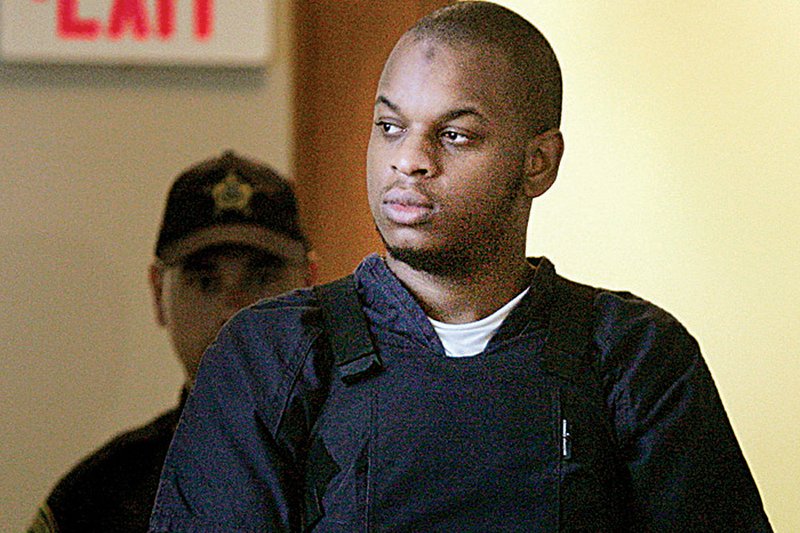LITTLE ROCK — Federal prosecutors are expected to clash today with attorneys for Abdulhakim Mujahid Muhammad over defense efforts to find out what the FBI knows about his activities leading up to the June 2009 slaying at a Little Rock recruiting center.
With his death-penalty trial 10 weeks away, Muhammad, born Carlos Leon Bledsoe, is to appear at 1:30 p.m. today before Judge Herb Wright in Pulaski County Circuit Court, his eighth appearance so far.
The hearing will give his lawyers the opportunity to challenge state prosecutors’ jurisdiction to try the 25-year old Muslim convert on capital murder, attempted capital murder and 10 other charges stemming from the shooting that killed Army Pvt. William Long and wounded Pvt. Quinton Ezeagwula. The men were taking a smoke break outside the recruiting station on Rodney Parham Road when they were shot. Muhammad was arrested within 15 minutes of the shooting.
The Memphis man has since admitted to the shootings in a series of letters to the court and interviews with police, press and psychiatrists, claiming the shooting was a “jihadi” attack in retribution for U.S. military policies he maintains target fellow Muslims. He has since come to claim ties to al-Qaida.
Muhammad’s attorneys are seeking to have the case against him dismissed, challenging the authority of Pulaski County prosecutors to try their client on state charges. They argue in court filings that the allegations against Muhammad involve terrorist acts that can only be prosecuted in the federal courts.
Prosecutors have countered that the crimes he is accused of committing are well within the purview of state law, and they will have the opportunity to refute defense arguments at today’s hearing.
But Muhammad’s efforts to obtain evidence collected by federal investigators outside the scope of the criminal case against him have drawn federal prosecutors into the fray. Those prosecutors are challenging efforts by defense attorney Claiborne Ferguson to force Special Agent James Todd Adams of the agency’s Joint Federal Task Force into providing testimony and evidence about Muhammad’s “indoctrination” in the Nashville area and his travels to Yemen, where he taught English and served time in prison, according to court filings.
Defense attorney Claiborne Ferguson wants Adams to surrender any surveillance video, computer files, e-mail and similar evidence it has collected regarding Muhammad.
“Your agent has information necessary to prove the whereabouts, contacts and actions related to the alleged acts of terrorism and/or attacks on the military personnel,” Ferguson claims in a letter to Jane Duke, U.S. attorney for the Eastern District of Arkansas, filed in circuit court. “Also, information is sought on the contact information of known or suspected terrorists contained in defendant’s phone when taken into custody in Yemen.
“Also, information concerning his arrest and possession of Somali papers and any statements from defendant concerning his plans to join Al Shabaab [a Somali Islamist insurgency movement] are requested as they will indicate that the allegations in the motions concerning his affiliation are truthful and accurate.”
The letter hints at defense strategy to persuade a jury not to sentence him to death, with Ferguson also seeking agency threat assessments regarding Muhammad “as we will be using the FBI’s failure to either identify him as a threat, failure to assess the threat ... or the FBI’s failure to monitor his operational activity leading up to the attacks .... but for these failures, no attack.”
Duke is refusing to allow Adams to provide the information the defense is seeking, writing that she had conducted an administrative review of the case in light of both his subpoena efforts and the challenge to state prosecutor’s authority.
Duke, represented by Assistant U.S. Attorney Dan Stripling, is asking the judge to quash Ferguson’s subpoena, arguing that Duke’s decision is protected by sovereign immunity, since the U.S. Department of Justice is not a party to the case. Ferguson’s only avenue to challenge the refusal is administratively through the Justice Department, Stripling wrote.
Also on tap for Muhammad today is his arraignment on a second-degree battery charge over accusations that he punched a deputy who was part of a contingent escorting him to a shower. Five officers tackled Muhammad and pepper-sprayed him in the October incident.
The case is the fourth to be brought against Muhammad during the 19 months he has been in custody involving allegations of assaults against deputies and a fellow inmate. The charges are all minor felonies, but prosecutors could use them against Muhammad in trying to convince jurors he deserves execution.
Arkansas, Pages 7 on 12/21/2010
